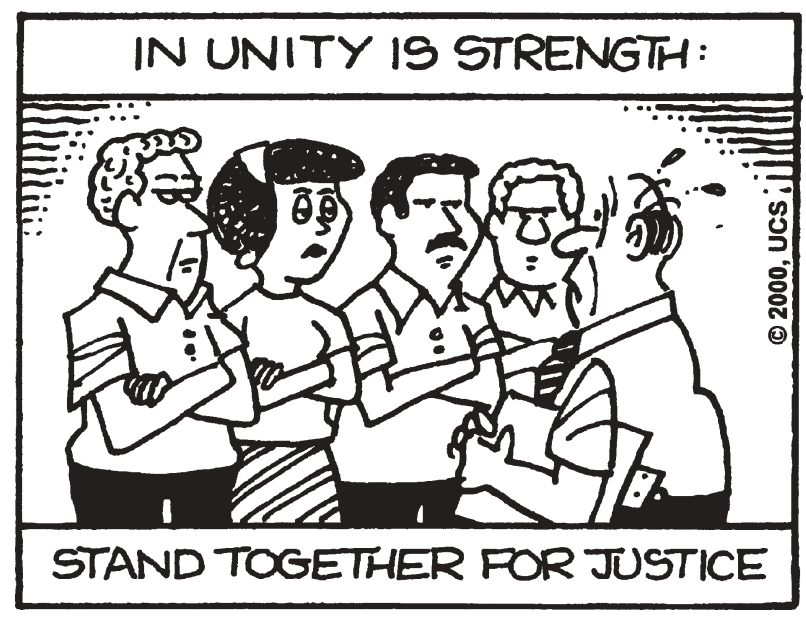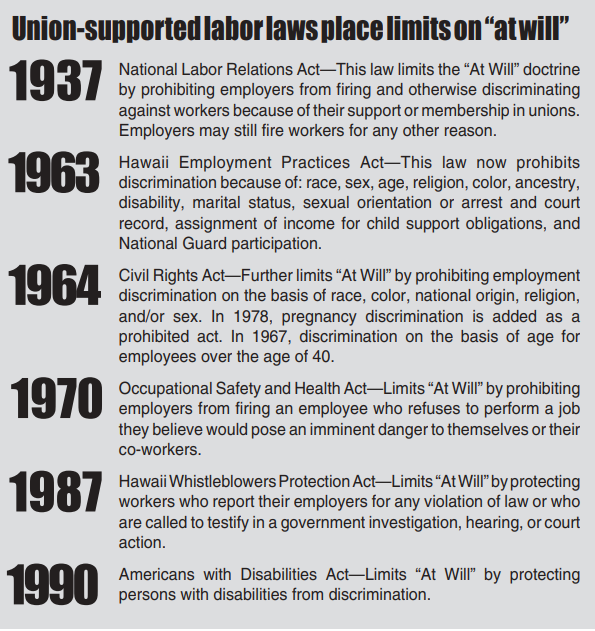Believe it or not, most workers organize into unions because of bad working conditions and poor treatment by management and not for higher wages and benefits. When workers are organized into unions, they gain the power to change their working conditions and demand respect and fair treatment from management.
With a union, workers have job security and can no longer be fired, transferred, or demoted at the whim of their bosses. In the United States, workers are hired “at-will.” This is a term which means workers are not slaves and can quit their job at their choice—or at their will. It also means an employer can fire a worker for any or no reason—or at the employer’s will. U.S. and Hawaii law only protects a worker from being fired for an illegal reason—such as discrimination by race, sex, age, religion, sexual orientation, ancestry, disability, marital status, or arrest and court record. However, unionized workers have a written contract which gives them additional protection against unjust or unfair firing or treatment on their job.
With a union, workers gain the power to meet with management on equal terms and bargain collectively to improve their wages and benefits. Union workers no longer have to go to their boss as individuals and beg for an increase in wages. With a union, workers have a voice on the job because management is required to negotiate with them on any chances in the terms and conditions of employment. With no union, management can take back benefits and change things on the job at anytime with no notice and no need to consult with workers.
Unions give workers dignity, respect, and a voice on the job. Many workers consider these to be the most valuable benefit of having a union.

Changed Your Address? Let us Know!
Did you know members have a duty to keep us informed of your latest home address?
The U.S. Post Office will only forward mail for 60 days, so send us a card to let us know you moved. We need your name, old address, and new address. Send the card to: Mailroom, ILWU, 451 Atkinson Drive, Honolulu, Hawaii 96814.
The scoop on . . .
“At will” employment—what does “at will” mean, anyway?
In the United States, an employee who does not have a union or any kind of agreement with their employer over job security, is considered an “at will” employee. This pretty much means all nonunion workers in private industry—or about 70 percent of U.S. workers—are at will.
An “at will” worker may be terminated by their employer at any time and for any or no reason. This means that a boss could wake up one morning and decide to fire the first employee he sees that day. As unfair as this may seem, it is perfectly legal under U.S. law.
The origin of this law goes back to the late 1800’s, a time when a handful of American capitalists amassed immense wealth and political power through their control of railroads, and later mass production factories and the banking system. The “at will” doctrine fit perfectly with their need for a disposal and unskilled workforce in their steel mills and giant factories.
The idea of “at will” first appeared in 1877 in a legal treatise by Horace C. Wood, when he wrote in Master and Servant that— “a general or indefinite hiring is prima facie a hiring at will” and can be ended at will by either party without liability. This broke from the English common-law rule that a general hiring was for a term of one year.
American judges picked up on this concept and within a few years, the “at will” doctrine included the idea that employers could dismiss employees for any reason. In 1884, the Tennessee Supreme Court ruled in favor of the Western & Atlantic Railroad Company that: “All may dismiss their employees at will, be they many or few, for good cause, for no cause or even for cause morally wrong, without being thereby guilty of legal wrong.”
The railroad had issued an order that any employee who shopped at Mr. Payne’s store would be discharged. Mr. Payne sued, but the court upheld that the railroad had the “right” to fire at will.
Limits on At Will
This idea of “at will” employment remains the law in nearly every state today. However, mostly through the success of union political action, a number of laws have been passed that protect employees and place important limits on an employer’s “freedom” to fire employees at will. Six of these laws are described below.
These are six examples of how union political action has improved the lives of working people. You can do your part by registering to vote and supporting the candidates endorsed by the ILWU Political Action Committee. The union endorses candidates who support programs that benefit working families.

